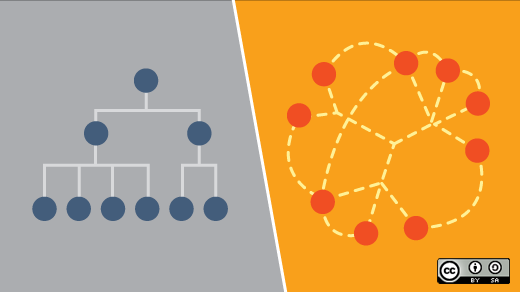Last week I received a heads up about a new web application launching today from a company called BetterMeans with an impressive goal: to build the infrastructure (processes, technology, governance, etc.) to make an open organizational structure like we talk about here on opensouce.com a reality.
From their website:
BetterMeans.com is a web platform where people can start and run companies in a new decentralized way.
- Teams self-form, self-organize, and self-manage using an issue-tracking tool
- There is no management class, only natural hierarchies.
- Leadership emerges organically by users earning other users’ confidence
- Compensation is based on contribution
- Strategy and ideas are crowd-sourced
- There’s full accountability and transparency. Relationships are built on trust.
- Ownership is distributed
- Capital allocation and decision-making are decentralizedIf a traditional company was a network architecture, it would be client-server.
We’re building a platform for peer-to-peer companies that are more agile, resilient, and innovative.
The video below explains what they are doing and why.
Very cool. In fact, if you are interested in taking a more in-depth look at how their web application works, you can watch a demo here.
The BetterMeans folks sent me a login last week so I could get in and play around with the application for a while (if you want to try it for yourself, go here).
A few observations:
- I'm impressed by how the small group behind BetterMeans is eating its own dog food. In their attempt to create a tool that could be used by real "open enterprises" (their term), they have actually organized themselves as an open enterprise—a prototype for their tool. Nice.
- They've written an interesting manifesto explaining why they created BetterMeans. It's worth a read—clearly they have been heavily influenced by the work of Gary Hamel.
- The tool itself is already fairly robust for a beta, although you get a much better sense for how it works from watching the demo than by playing around with it (to take advantage of most of the features you need to have a whole team of people involved).
- Some of the functionality is perhaps a little too democratic by default for my taste. In a BetterMeans project, everyone gets an equal vote. In my experience, open source projects often aren't democracies but instead meritocracies where people earn influence over time through good ideas and good contributions. My view? It is not always important to have a completely democratic decision-making process, but instead to have a clearly articulated and completely transparent decision-making process. Sometimes it actually may be fully democratic, sometimes it may be a leader taking in input from everyone and then making the final decision by him or herself, and sometimes the final decision is made by a subset of the larger group.
As an opensource.com contributor, I feel it is my duty to point out that the BetterMeans platform itself is not open source, even though they clearly want it to be. From their FAQ:
We're not open source, because we haven't figured out a business model that sustains us and keeps our software open source. The moment we do, we will open source the software.
Meanwhile, we are focussed on opening up the org structures. If folks are passionate about opening up the bettermeans source, they can join us, and help us figure out how to do it, and pay our bills.
Fair enough. Maybe some of you folks in the opensource.com community could help them?
Overall, although it is still clearly an experiment, I'm digging the direction this project is going.
The primary challenge will be to get people to embrace Yet Another New Platform. In fact, a mashup of BetterMeans and the tools the 37signals folks make (which many organizations already use) might be pretty awesome.
We'll never create the infrastructure for open organizations if no one leads the way. I believe the team behind BetterMeans is providing strong leadership in the right direction.
What do you think?






2 Comments